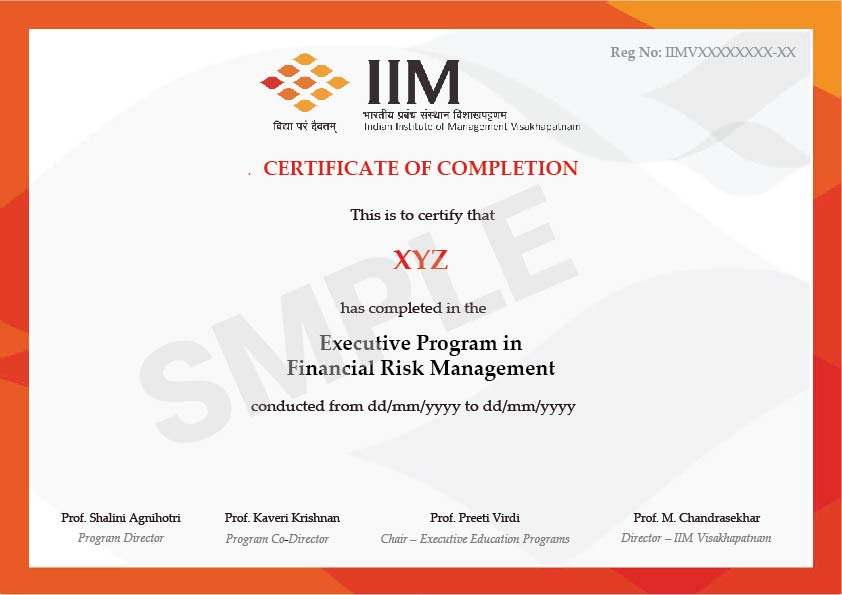Weekend Sessions
Campus Immersion
NIRF
Expert Faculty
Course Designed By the IIM Experts for the Future Leaders
Finishing the course successfully could earn you an IIM certificate, renowned for its strong corporate world reputation.
In-depth course covering financial risk management: theory, tools, risk assessment, mitigation, derivatives, credit, market & operational risks.
Classes at IIMs generally feature instruction by adept and well-informed faculty members, possessing significant proficiency in the realms of finance and risk management.
The program frequently incorporates real-world cases and examples, offering practical insights into financial risk management for businesses.
The program's content syncs with current financial risk management trends, imparting pertinent skills for today's business landscape.
Attendees can engage with fellow experts, fostering a valuable peer network and opportunities for collaboration.







Earning a Financial Risk Management certification from IIM Visakhapatnam presents a myriad of advantageous outcomes. This accomplishment marks a pivotal stride in your professional journey, propelling you into the echelon of strategic leadership while equipping you with profound insights and aptitudes to comprehend the intricate facets of financial risk management. The returns on this investment manifest in manifold ways—career progression, adeptness in pertinent proficiencies and tools such as Excel and R, augmented remuneration, avenues for networking, heightened acumen in leadership, fortified job stability, fostering innovation and digital metamorphosis, and an array of further benefits waiting to be reaped.
Upon successful completion of the Executive Certificate Program in Financial Risk Management, IIM Visakhapatnam Executive Education will grant a verified certificate to participants. To be eligible for the certificate, participants must meet the minimum attendance criteria and satisfactorily submit the final project.

Participants will be advised by professional counselors over the virtual mode
Profiles will be shortlisted in view of qualification standards and counselor comments on the profile.
Shortlisted profiles will have a virtual meeting with the IIM faculty panel.
Approved participants shall receive a call letter from IIM to process further enrollment.
A participant's seat in the program gets affirmed once the enrollment process is completed.
Closes in: 5 days
Indian Institute of Management Visakhapatnam (IIMV) belongs to the prestigious IIM family of business schools. It is a new generation IIM, set up by the Government of India in September 2015. At 29th place among the business schools pan-India in the National Institutional Ranking Framework 2022 of the Government of India, it is ahead of all new-generation IIMs established in 2015/2016.
Visakhapatnam is a picturesque port-city on the east coast of India. It is easily accessible by air, sea, rail, and road connections. It ranks among the cleanest cosmopolitan cities in the country. The city is a popular tourist destination with a beautiful beach on one side and a majestic mountain-range on the other. The vibrant city is well known for its heritage and hospitality; culture and cuisine; tradition and talent; trade and technology; innovation and industry; entrepreneurship and enterprise.
Visakhapatnam is a base to several large, medium, and small companies (public and private) in the core sector, energy, financial services, infrastructure, IT, pharma, etc. The Eastern Naval Command of the Indian Navy is headquartered at Visakhapatnam. In short, it is one of the most preferred destinations in India to live, learn, yearn, and earn.


Financial Risk Management encompasses the systematic process of recognizing, evaluating, and alleviating potential hazards that have the potential to influence the economic steadiness, profitability, and overall efficacy of an individual or a group. This practice entails the execution of tactics and actions aimed at overseeing diverse financial perils, guaranteeing that unfavorable incidents do not adversely affect the financial well-being of the entity.
Diverse sources can give rise to financial risk, encompassing fluctuations in the market, defaults in credit, alterations in interest rates, shifts in currency values, limitations in liquidity, breakdowns in operations, and issues of compliance with regulations. Each of these hazards presents distinct complexities, and the efficacious management of financial risk strives to curtail their repercussions and safeguard the financial assets and investments of the organization.
The IIM Online Financial Risk Management Course is priced at INR 70,000/-, exclusive of 18% GST. For your convenience, the payment can be split into three easily manageable installments.
The remuneration for professionals engaged in Financial Risk Management in India is directly linked to their years of experience:
1. Individuals entering the field as Financial Risk Managers (FRMs) at the initial stage, with under three years of practical experience, can typically anticipate receiving an average comprehensive package ranging from ₹4.5 LPA to 5 LPA.
2. Financial Risk Managers (FRMs) in the middle phase of their careers, encompassing 4 to 9 years of experience, command an average total remuneration spanning ₹9.7 LPA to 11 LPA.
3. Senior Financial Risk Managers (FRMs) possessing 10 to 20 years of experience amass an average total compensation lying between ₹18.2 LPA to 20 LPA.
4. Seasoned Financial Risk Managers (FRMs) with an extensive experience surpassing 20 years are rewarded with an average comprehensive package within the range of ₹23 LPA to 25 LPA.
Upon successful completion of financial risk management courses, professionals unlock a plethora of promising career prospects within and beyond the financial industry. The specialized expertise and competencies acquired through these courses swing open the doors to diverse vocational trajectories. Here are several avenues that one can explore:
1. Financial Risk Manager: Graduates possess the capability to embrace roles as financial risk managers, tasked with the identification, scrutiny, and alleviation of financial vulnerabilities within an enterprise.
2. Risk Analyst: The sphere of risk analysis offers viable career opportunities. As risk analysts, individuals engage in comprehensive risk evaluations and furnish insights that steer strategic deliberations.
3. Credit Risk Manager: A specialization in credit risk management beckons. This avenue involves the assessment of creditworthiness and adept handling of risks tethered to credit domains.
4. Market Risk Analyst: The role of a market risk analyst is another avenue. These professionals focus on dissecting market undulations and their ramifications on financial portfolios.
5. Compliance Officer: Graduates have the option to venture into compliance officer roles. These positions encompass the enforcement of regulatory mandates and the propagation of risk management paragons.
6. Investment Risk Analyst: A pathway as an investment risk analyst is also available. These analysts gauge risk exposure and optimize investment tactics for maximal gains.
7. Treasury Analyst: The capacity of a treasury analyst awaits exploration. These experts navigate roles involving the management of liquidity and interest rate perils for organizations.
8. Financial Consultant: Graduates can chart a trajectory as financial consultants, extending adept counsel on risk management tactics to corporate entities and clientele.
9. Quantitative Analyst (Quant): Career avenues materialize as quantitative analysts. These professionals employ mathematical and statistical models to appraise financial hazards.
10. Risk Management Consultant: A role as a risk management consultant is feasible. Professionals function as consultants, proffering guidance to establishments in the formulation of robust risk management frameworks.
In line with the stipulated prerequisites outlined by IIM Visakhapatnam for enrollment in the Chief Information Officer (CIO) Course, potential candidates are required to satisfy the subsequent eligibility conditions:
1. Academic Credentials: Individuals should hold a Bachelor's degree in any discipline or hold a diploma of comparable standing.
2. Professional Background: Aspirants are required to possess at least one year of practical experience in their relevant fields.
For a more thorough understanding and resolution of any uncertainties, individuals showing interest in the course are warmly welcome to initiate a discussion with the course counselor.
The value of pursuing the Financial Risk Manager (FRM) certification from IIM Visakhapatnam, or any similar professional certification, hinges on your individual career objectives, personal interests, and the specific industry you intend to enter. Here are several factors to contemplate when evaluating the potential worth of FRM for you in the context of India:
1. Career Prospects: The FRM certification enjoys global recognition, especially within risk management, finance, and banking sectors. If your ambitions involve roles related to risk assessment, risk management, portfolio management, or financial analysis, particularly within these industries, holding an FRM certification could amplify your prospects of securing suitable employment.
2. Skill Enrichment: The comprehensive FRM syllabus encompasses an array of subjects pertaining to financial risk management, encompassing credit risk, market risk, operational risk, and risk modeling. Acquiring this certification could substantially deepen your competencies and proficiencies in this domain, augmenting your attractiveness to potential employers.
3. Professional Credibility: Attaining the FRM designation showcases your dedication to the realm of risk management and underscores your prowess to prospective employers and clients. This achievement might provide a competitive advantage in a congested job arena, setting you apart from fellow contenders.
4. Networking Avenues: Attaining FRM status unlocks avenues for engaging with other professionals in the field through diverse industry events, conferences, and specialized networking platforms. Networking assumes a pivotal role in career progression and accessing fresh employment opportunities.
5. Industry Validation: The financial industry accords high esteem to the FRM certification, with numerous employers esteeming it as an indicator of a candidate's adeptness and allegiance to risk management best practices.
6. Return on Investment (ROI): It's prudent to evaluate the costs linked to obtaining the FRM certification, including examination fees, study materials, and the time allocated to preparation. Assess whether the potential benefits, such as heightened salary prospects or expanded job openings, validate the investment aligned with your precise career objectives.
Ultimately, the choice to pursue the FRM certification in India or any comparable credential must be in sync with your vocational aspirations and the requirements of the industry. Delve into the job market landscape and converse with professionals within your targeted sector to garner insights into the applicability of the FRM certification within your specific context. Keep in mind that professional certifications are just one dimension of professional advancement; accruing practical experience and honing vital proficiencies are equally vital constituents in fostering a triumphant career journey.
The decision regarding the relative merits of the FRM certification versus the CFA certification hinges upon your particular career objectives, inclinations, and the sector within which you aspire to operate. Although both designations are held in high esteem within the financial realm, they cater to distinct fields of expertise. Let's juxtapose these two certifications to better discern their disparities:
Focal Points and Expertise
1. FRM: The FRM certification revolves around the specialized domain of financial risk management. Its purview encompasses subjects such as risk appraisal, modeling, analytic methods, and strategies for mitigating risk. This track is especially suitable for professionals aiming for roles in risk management, investment banking, or positions that involve scrutinizing risk.
2. CFA: Conversely, the CFA certification boasts a broader orientation, concentrating on investment scrutiny, portfolio administration, and financial assessment. It traverses a wide spectrum of financial and investment-related subjects, making it a prime choice for individuals interested in portfolio management, equity analysis, and investment appraisal.
Reputation and Industry Perception
1. FRM: The FRM certification enjoys significant prestige within risk management and financial services. Its global recognition renders it highly sought after by employers seeking adeptness in risk management.
2. CFA: The CFA charter also garners commendable repute and is extensively acknowledged within the investment management arena. It often signifies a dedication to the investment sector and is particularly prized by asset management entities, investment banks, and financial establishments.
Avenues for Professional Advancement
1. FRM: Professionals who hold the FRM certification are aptly suited for roles in risk management, credit risk evaluation, financial modeling, and akin domains.
2. CFA: CFA charter holders typically gravitate towards vocations in portfolio management, equity analysis, financial assessment, investment banking, and other financial facets.
In the end, the choice between pursuing the FRM or CFA designation is contingent upon your vocational aspirations and the specific positions that attract you. Some practitioners may even opt to undertake both certifications to augment their understanding and broaden their professional avenues.